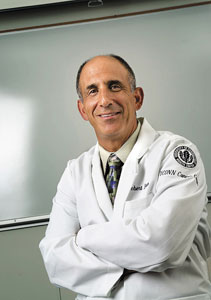  |
| HOME | THIS ISSUE | CALENDAR | GRANTS | BACK ISSUES | < BACK | NEXT > |
Award-winning medical professor likes distilling information for studentsby Pat Keefe - August 28, 2006 |
||||
|
Dr. Robert Bona, professor of medicine, joined the Health Center faculty full-time in 1997 because he wanted to expand his role in the education of medical students. The students are glad he did. They have twice selected him the best teacher and awarded him the Loeser Award for excellence in teaching. He first received the award in 2000, and won it again this year. A teaching committee of which Bona is section head also received an award this year: it was selected by students for the 2006 Golden CAMEL Award (the Committee Award for Meritorious Educational Leadership). It is the second year in a row the committee has won this award under his direction. "I'm very honored to be recognized by the students," he says. "There are so many deserving faculty members." Bona, a hematology-oncologist, also sees patients in the Neag Comprehensive Cancer Center. He says that in addition to the enjoyment of sharing information with eager students, teaching helps make him a better physician. "I like explaining things that are complex and complicated in a way that people can understand," he says. "We do this with patients as well. I enjoy distilling information so that important ideas are highlighted, and appropriate details are underscored." He says teaching is a challenge - especially teaching medical students. "To teach, you have to learn at a high level - you're teaching very smart people in medical school - and you have to be prepared," he adds. "Their questions can be very sophisticated. It forces you to know your subject and think creatively about it." Bona uses both the chalkboard and PowerPoint for lecturing, but prefers the chalkboard. The tempo is better, he says. "Using the chalkboard slows me down. It allows me to be clearer and repeat things that are important. The disadvantage, of course, is that you don't have all the pretty graphics.
"Often, I'll make a PowerPoint and give it to students," he says, "but I'll do the majority of the lecture on the chalkboard. For me, it's more effective. The students are active and take notes, and the method demands more from them." He teaches coagulation and iron metabolism to first year medical students. During the students' second year, he teaches red cell disorders, coagulation, and hematologic malignancies. In the third year, he directs the inpatient course, a 16-week experience for students, and is involved in the three sessions of the "home week." During home week, students on a particular rotation return to the Health Center for a week-long curriculum. In the fourth year, he teaches coagulation and transfusion during the Intensive Care Unit experience. He also supervises, advises, and coordinates the post-medical graduates of the Hematology-Oncology Fellowship. A native of Long Island, Bona received his undergraduate degree from St. John's University in Jamaica, N.Y., and his medical degree from Upstate Medical College, Syracuse, N.Y. He was an intern and resident at Brown-Rhode Island Hospital in Providence; did a fellowship in hematology-oncology at the Health Center - the same program he runs today; and took training in clinical thrombosis at McMaster University in Ontario. The Loeser Award is named after Dr. Charles Loeser, an anatomist and early faculty member at the Health Center. It is given each year to a faculty member for teaching excellence in the basic sciences. The criteria include dedication to advancing students' welfare and education, the ability to evoke in students enthusiasm for learning.
|
| ADVANCE HOME UCONN HOME |

